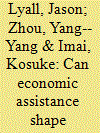| Srl | Item |
| 1 |
ID:
171339


|
|
|
|
|
| Summary/Abstract |
Governments, militaries, and aid organizations all rely on economic interventions to shape civilian attitudes toward combatants during wartime. We have, however, little individual-level evidence that these “hearts and minds” programs actually influence combatant support. We address this problem by conducting a factorial randomized control trial of two common interventions—vocational training and cash transfers—on combatant support among 2,597 at-risk youth in Kandahar, Afghanistan. We find that training only improved economic livelihoods modestly and had little effect on combatant support. Cash failed to lift incomes, producing a boom-and-bust dynamic in which pro-government sentiment initially spiked and then quickly reversed itself, leaving a residue of increased Taliban support. Conditional on training, cash failed to improve beneficiaries’ livelihoods but did increase support for the Afghan government for at least eight months after the intervention. These findings suggest that aid affects attitudes by providing information about government resolve and competence rather than by improving economic livelihoods.
|
|
|
|
|
|
|
|
|
|
|
|
|
|
|
|
| 2 |
ID:
127914


|
|
|
|
|
| Publication |
2014.
|
| Summary/Abstract |
While physical interventions such as external wall cladding can improve the energy efficiency of domestic properties, how residents think about and respond to such interventions can influence both their uptake and impact on the household's energy use. The present research investigated what residents living within deprived communities in Yorkshire and the Humber (United Kingdom) thought about a number of household energy efficiency interventions proposed as part of a project known as "The BIG Energy Upgrade". The Theory of Planned Behaviour was used as a framework for investigating residents' beliefs. Residents generally felt positive about the proposed interventions and expected that they would lead to financial savings, improve the appearance and warmth of their homes, and sense of pride in the local community. However, while residents intended to adopt energy efficiency interventions if offered them, they were less willing to personally invest in them. Home ownership and the belief in humans' ability to tackle climate change were found to predict willingness to invest. These findings help to understand responses to initiatives that seek to improve the energy efficiency of hard-to-treat homes.
|
|
|
|
|
|
|
|
|
|
|
|
|
|
|
|